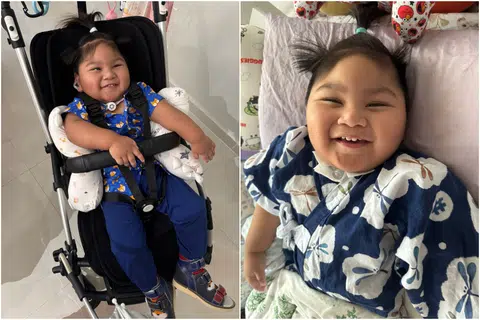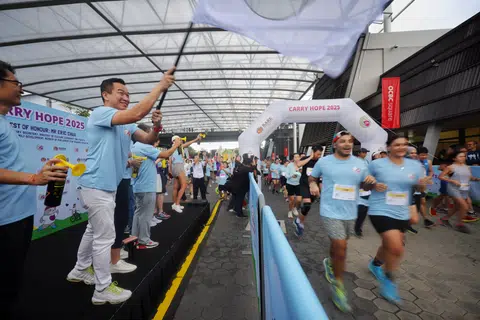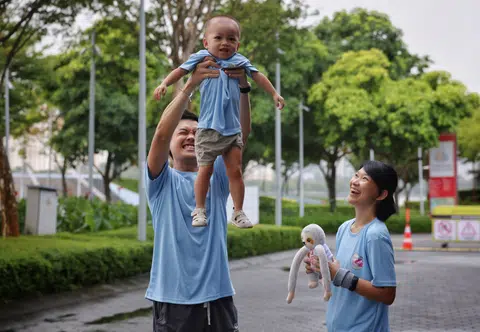Help raise funds to help families dealing with rare diseases
When Ms Kristal Mir noticed that her son was not developing normally at two months old, she sent him for check-ups.
After three months and two wrong diagnoses, she learnt that Atlas has FoxG1 Syndrome, a rare genetic neurodevelopmental condition that affects brain development and function.
Currently, there are about 1,200 patients around the world diagnosed with the incurable syndrome, according to the FoxG1 Research Foundation, which was set up by parents.
With this condition, Atlas - who will be two years old in April - is unable to speak, move or eat normally.
"It is an emotional task to care for him. But we believe we can give him a complete life on his own terms," Ms Mir, 34, told The Straits Times.
Caring for patients with rare conditions can be expensive.
Ms Mir and her family have to fork out about $2,000 a month for medical check-ups, therapy sessions, medication, school bills and necessities.
Atlas may also eventually need a paediatric buggy, which can cost between $2,000 and $10,000 depending on the child's needs.
As he grows up, he may also need assistive technology equipment, such as a robot gait trainer, to help him move around.
These trainers can cost about $52,000, said Ms Mir.

The mother of two has been receiving support from Rare Disorders Society (Singapore), or RDSS, where she learns how to care for Atlas better and bond with other parents who have children with rare conditions.
RDSS was set up in 2011 to create awareness about various life-threatening rare diseases.
To mark World Rare Disease Day - which falls each year on the last day of February - the charity held events, including a carnival and the Carry Hope Walk and Run on Feb 22, to raise awareness and funds and generate support for individuals and families who are affected by rare diseases, with a target of raising $700,000.
It will be used to fund a subsidy programme, to reduce the financial burden of families who need to purchase equipment.

RDSS executive director Phua Wee Seng said about half of the rare disease patients it helps have high support needs, requiring at least one medical device for life support.
RDSS is aiming to benefit about 100 beneficiaries through the subsidy programme.
"These devices are often expensive, in the five-figure range, and they have a lifespan and break down at times," said Mr Phua.
He said one family had a ventilation machine that broke down due to frequent usage.
The family did not have a back-up device. Such situations can cause caregivers immense stress and threaten patients' lives, said Mr Phua.
"Many rare-disease families often live by the day due to high medical expenses.
"They may not be able to afford the equipment if we do not provide financial support for them," he added.
A forum was held on Feb 21 to discuss rare diseases, including advancements in technologies, and how they can be integrated into national health strategies.
Mr Felix Lu, whose son Ansel was diagnosed with Lama2 muscular dystrophy, said financial challenges add to the emotional struggle of raising a child with a rare syndrome.
The 37-year-old said he spent up to $70,000 in the first year after his two-year-old was diagnosed with the condition, a disorder that causes weakness and atrophy of muscles used for movement.
Besides having to get an electric wheelchair for him, Mr Lu said he may also have to retrofit their house to make it accessible for Ansel.

"The costs for therapy, equipment and hospital visits are overwhelming.
"We're deeply concerned because even if a cure becomes available, we might not be able to afford it, given that such treatments often run into the millions," he said.
Mr Lu said he is taking the situation one step at a time and hopes that Ansel will be able to come to terms with his condition when he is older.
As for Atlas, Ms Mir said: "Despite the challenges, Atlas' journey has also been filled with moments of joy, love and connection.
"We remain hopeful that continued research, advocacy and support will bring about positive change for him and those affected by rare diseases."
Chin Hui Shan for The Straits Times